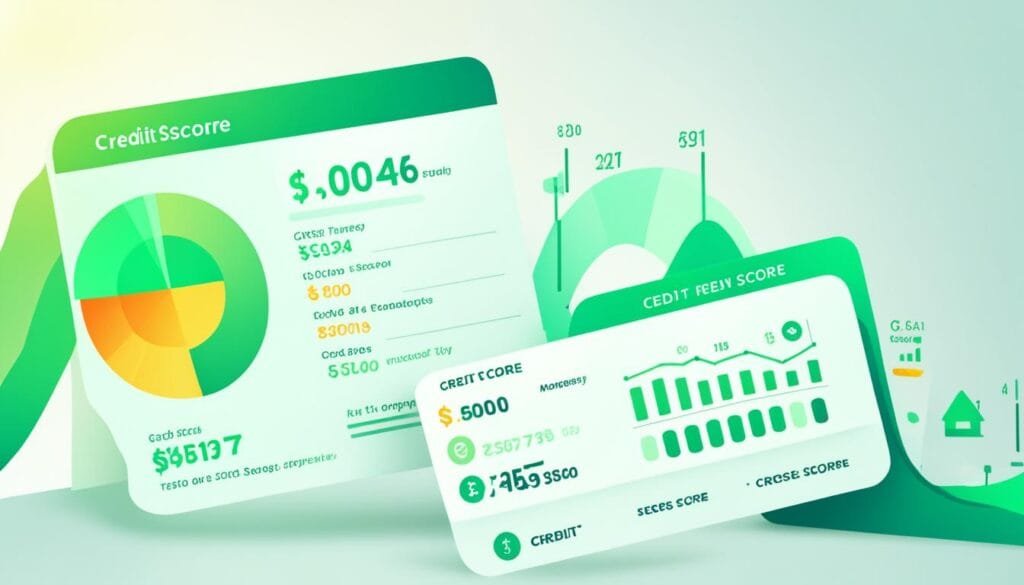Establishing a good credit score is crucial for various financial endeavors, but there are several common misconceptions surrounding credit scores. In this article, we will debunk these myths and provide you with the facts to help you make smarter financial decisions and improve your credit score.
Understanding credit score and debunking credit score myths is essential for anyone looking to improve their financial standing. There are numerous common credit score myths that can hinder your progress in raising your credit score. By knowing the truth, you can take proactive steps towards achieving a better credit score.
Key Takeaways:
- Don’t believe the myth that checking your credit score lowers it. Regularly monitoring your credit score through legitimate sources does not impact it.
- Carrying a balance on your credit card does not boost your credit score. It is recommended to pay off your balance in full each month to maintain a good credit score.
- Your income does not directly impact your credit score. Factors such as payment history, credit utilization, and length of credit history have a more significant influence.
- A good credit score does not mean you are rich. It reflects your creditworthiness and doesn’t necessarily indicate your wealth or income level.
- Having a perfect credit score does not provide additional benefits beyond a certain credit score range. Focus on achieving a credit score that qualifies you for the best deals.
Myth: Checking my credit score lowers my credit score
One common misconception about credit scores is the belief that checking your credit score can actually lower it. However, this is a myth that can create unnecessary worry and confusion. In reality, checking your credit score through legitimate sources, such as credit bureaus, is considered a “soft pull” and does not have any impact on your credit score.
It’s important to understand the difference between a “soft pull” and a “hard pull” when it comes to credit inquiries. A soft pull is when you check your credit score for informational purposes, such as credit score monitoring or staying updated on your financial health. This type of inquiry has no effect on your credit score whatsoever.
On the other hand, a hard pull occurs when you apply for new credit, such as a credit card or loan. Lenders typically need to assess your creditworthiness before approving your application, which requires a hard pull. While hard pulls are necessary for credit decisions, they can temporarily lower your credit score by a few points.
Fortunately, there are many credit score apps available today that allow you to check your credit score conveniently and for free. These apps utilize soft pulls to provide you with accurate and up-to-date information about your credit score. Some popular credit score apps include Discover’s Credit Scorecard and Chase’s Credit Journey.
By debunking the myth that checking your credit score lowers it, you can confidently monitor your credit score and make informed financial decisions without any unnecessary concerns.
Key Takeaways:
- Checking your credit score through legitimate sources is a “soft pull” and does not impact your credit score.
- Applying for credit cards or loans requires a “hard pull,” which can temporarily lower your credit score.
- Credit score apps like Discover’s Credit Scorecard and Chase’s Credit Journey offer free and convenient ways to monitor your credit score.
Myth: Carrying a balance on my credit card boosts my credit score
One of the most common credit score myths is the belief that carrying a balance on your credit card can actually improve your credit score. However, this is far from the truth. In fact, carrying a balance on your credit card can potentially hurt your credit score.
Let’s understand why:
- Credit Card Balance: Carrying a balance means that you have an outstanding amount on your credit card that you haven’t paid off in full. While it’s important to use your credit card regularly to build a credit history, carrying a balance does not have any direct positive impact on your credit score.
- Credit Utilization Rate: Your credit utilization rate is the percentage of your available credit that you’re using. It is calculated by dividing your credit card balance by your credit limit. Carrying a high balance can significantly increase your credit utilization rate, which may negatively impact your credit score. Lenders perceive high credit utilization as a potential risk, suggesting that you may rely heavily on credit and have difficulty managing debt responsibly.
Instead of carrying a balance, it is advisable to pay off your credit card balance in full each month. This not only helps you avoid unnecessary interest charges but also keeps your credit utilization rate low, demonstrating responsible credit management.
If you currently have a balance on your credit card, don’t worry. There are strategies you can use to lower your credit utilization rate:
- Make larger payments: by making more substantial payments than the minimum required amount, you can quickly reduce your credit card balance and lower your credit utilization rate.
- Consider a balance transfer credit card: A balance transfer credit card allows you to transfer your existing credit card balances to a new card with a lower interest rate or even a 0% introductory APR. This can help you save on interest charges and pay off the balance more efficiently. However, be sure to read the terms and conditions, including any balance transfer fees, before making a decision.
By understanding the truth behind this credit score myth, you can make smarter financial decisions and work towards improving your credit score.
Myth: My income impacts my credit score
Contrary to popular belief, your income does not directly impact your credit score. Your credit score is determined by various factors that reflect your creditworthiness and financial responsibility. These factors include:
- Payment History: Your track record of making on-time payments to creditors.
- Credit Utilization: The amount of credit you use compared to your total credit limit.
- Length of Credit History: The duration of time you’ve held credit accounts.
- New Credit: The number of recently opened credit accounts or credit inquiries.
- Credit Mix: The variety of credit accounts you have, such as credit cards, loans, and mortgages.
While a higher income may provide you with more financial flexibility to manage your credit and debt, it is not a direct factor in determining your credit score. It’s important to focus on maintaining a positive payment history, keeping your credit utilization low, and demonstrating responsible credit management habits, regardless of your income level.
“Your credit score reflects your financial behaviors and creditworthiness, not your income level.”
Understanding the credit score factors that truly matter will help you make informed decisions to improve and maintain a healthy credit score.
| Credit Score Factors | Description |
|---|---|
| Payment History | Reflects your track record of making on-time payments to creditors. |
| Credit Utilization | Measures the percentage of available credit you’re currently using. |
| Length of Credit History | Considers the length of time you’ve held credit accounts. |
| New Credit | Takes into account recent credit accounts opened or credit inquiries. |
| Credit Mix | Considers the variety of credit accounts you have. |
By focusing on these credit score factors, you can take steps to improve your credit score and achieve better financial stability.

Myth: A good credit score means you’re rich
Having a good credit score does not necessarily mean that you are rich. A credit score is a measure of your credit risk, indicating whether you are a good or poor candidate for credit. It does not reflect your wealth or income level. While a good credit score can open up opportunities for better credit terms, such as lower interest rates, it is not indicative of your financial status.
It’s important to understand that credit scores are based on factors such as payment history, credit utilization, length of credit history, new credit, and credit mix. These factors assess your ability to manage credit responsibly, not your wealth.
“A credit score is not a measure of wealth, but rather a measure of creditworthiness.”
Even individuals with high incomes may have poor credit scores if they have a history of late payments or excessive debt. On the other hand, someone with a lower income may still have a good credit score if they have a solid credit history and low credit utilization.
Additionally, credit scores do not take into account assets, investments, or savings. They solely evaluate your credit risk based on your borrowing and repayment history. A good credit score simply means that you are considered a reliable borrower, not necessarily wealthy.
It’s also worth mentioning that credit limits on credit cards are not solely determined by income. Some credit cards, like the American Express Gold Card, offer a line of credit with no preset spending limit. This means your credit limit is not based on your income, further highlighting the disconnect between credit scores and wealth.

Myth: A perfect credit score doesn’t really matter
When it comes to credit scores, achieving perfection may seem like the ultimate goal. However, the truth is that having a perfect credit score doesn’t provide any additional benefits beyond a certain point. While a high credit score is undoubtedly advantageous, reaching the pinnacle of perfection doesn’t offer any distinct advantages in terms of credit score benefits.
Typically, once you achieve a credit score range of around 760 or higher, you’ll likely qualify for the best deals on loans and credit products. This is the range where lenders consider you to be a low-risk borrower and offer you favorable interest rates and terms. Whether your credit score is 760 or 850, you’ll already be in the top tier and eligible for the same benefits.
It’s important to note that credit scoring models vary, and different lenders have different criteria for evaluating creditworthiness. However, in general, perfection doesn’t necessarily open up a new world of credit opportunities once you’ve met the threshold.
Instead of obsessing over achieving a perfect credit score, it’s more important to focus on maintaining a good credit score within this optimal range. By doing so, you’ll still enjoy the credit score benefits of qualifying for the best deals and interest rates, without the added pressure of chasing perfection.
Remember, a credit score is just one component of your overall financial health. While it’s essential to have a good credit score, it’s equally crucial to practice responsible financial habits, such as paying bills on time, keeping credit card balances low, and avoiding excessive debt. These habits will contribute to a strong credit score and overall financial well-being.
Myth: I don’t need to worry about my credit score until I’m older
It is a common misconception that you don’t need to start building your credit score until you’re older. However, the truth is that establishing a good credit history should start as early as possible. Your credit history is a vital factor in determining your credit score, so the longer you have a positive credit history, the better it is for your overall creditworthiness.
Young individuals should consider getting their first credit card and using it responsibly to begin building their credit. It’s important to make timely payments and keep the credit card balance low to demonstrate good credit behavior. By developing responsible credit habits early on, you can lay a solid foundation for your credit score and future financial opportunities.
For college students looking to start their credit journey, there are specific credit cards designed for their needs. These credit cards for college students often come with lower credit limits and special features that help them manage their finances effectively. They can be a great tool for learning financial responsibility while building credit.
Remember, building credit is not just about the present, but also about preparing for future financial endeavors. By starting early and being responsible, you can set yourself up for success and open up doors to better credit options in the future.
Can You Clarify the Facts About Credit Score Myths?
Confused about your credit score myths debunked? Don’t believe everything you hear. It’s time to set the record straight on common misconceptions. Understanding the truth about credit scores can help you make better financial decisions. Let’s clarify the facts and debunk those credit score myths.
Conclusion
In conclusion, understanding the truth behind common credit score myths is crucial for making smart financial decisions and improving your credit score. By debunking these misconceptions, you can take proactive steps towards managing your finances effectively and achieving a higher credit score.
Don’t fall for the myths that checking your credit score lowers it or that carrying a balance on your credit card boosts your score. Instead, utilize credit score monitoring tools and pay off your credit card balance in full each month to maintain a healthy credit score. Remember that your income does not directly impact your credit score; it is your payment history, credit utilization, length of credit history, new credit, and credit mix that play significant roles.
It’s important to note that having a good credit score doesn’t automatically mean you’re rich. A good credit score represents your creditworthiness and helps you qualify for better credit terms, but it does not reflect your wealth or income level. Additionally, achieving a perfect credit score may not provide any additional benefits once you are already within the optimal credit score range for the best deals on loans and credit products.
Start building your credit history as early as possible, as it is not something that can be left until you’re older. Take advantage of credit cards designed for college students and establish responsible credit habits from the beginning. By understanding the facts and busting the myths surrounding credit scores, you can make smarter credit choices that improve your credit score and set you on the path to financial success.
FAQ
Does checking my credit score lower my credit score?
No, checking your credit score through legitimate sources is considered a “soft pull” and does not affect your credit score. However, applying for credit cards or loans, which requires a “hard pull,” can temporarily lower your credit score. There are also various apps available that allow you to check your credit score for free.
Does carrying a balance on my credit card improve my credit score?
No, carrying a balance on your credit card can actually hurt your credit score, especially if it leads to a high credit utilization rate. It is recommended to pay off your credit card balance in full each month to maintain a good credit score. If you are already carrying a balance, consider transferring it to a balance transfer credit card with a lower interest rate.
Does my income directly impact my credit score?
No, your income does not directly impact your credit score. Factors that do affect your credit score include your payment history, credit utilization, length of credit history, new credit, and credit mix. While a higher income may give you more financial flexibility, it does not automatically lead to a better credit score.
Does having a good credit score mean I am rich?
No, having a good credit score is not indicative of your wealth or income level. It is a measure of your credit risk, indicating whether you are a good or poor candidate for credit. While a good credit score can open up opportunities for better credit terms, it does not reflect your financial status. Additionally, there are credit cards that have no preset spending limit, which means your credit limit is not based on your income.
Does having a perfect credit score matter?
Achieving a perfect credit score does not provide any additional benefits beyond a certain credit score range. Once you reach a certain range, typically around 760 or higher, you will likely qualify for the best deals on loans and credit products. Having a perfect score does not offer any distinct advantages.
Should I worry about my credit score when I’m young?
Yes, it is important to start building credit as early as possible. The length of your credit history is an important factor in your credit score, so young individuals should consider getting their first credit card and establishing responsible credit habits. There are specific credit cards available for college students to help them begin their credit journey.
What are the common credit score myths?
Common credit score myths include the belief that checking your credit score can lower it, carrying a balance on your credit card improves your score, your income directly impacts your credit score, a good credit score means you are rich, a perfect credit score is necessary, and you don’t need to worry about your credit score until you’re older. These myths have been debunked.
How can I improve my credit score?
To improve your credit score, focus on making timely payments, keeping your credit utilization rate low, maintaining a long credit history, avoiding opening too many new credit accounts, and having a healthy mix of credit types. Additionally, regularly monitor your credit report for errors and dispute any inaccuracies you find.

